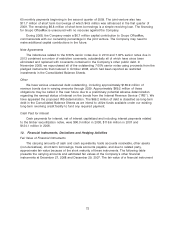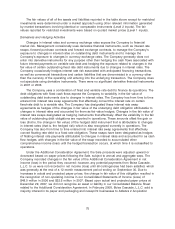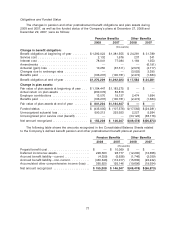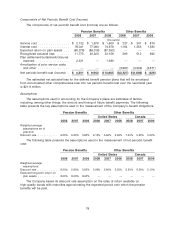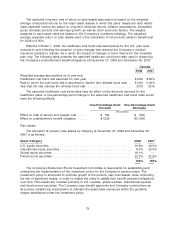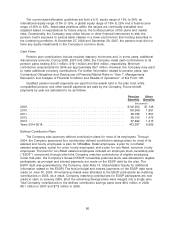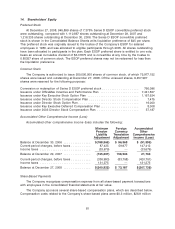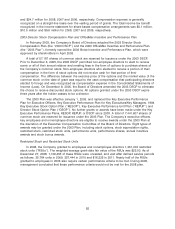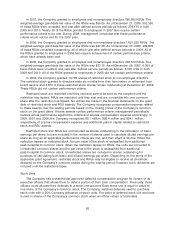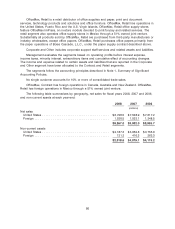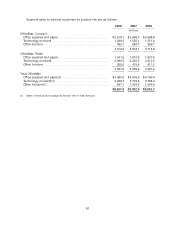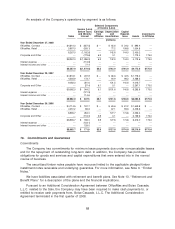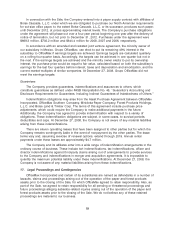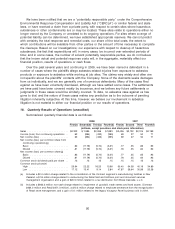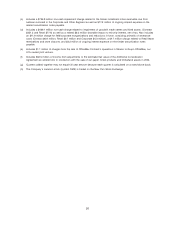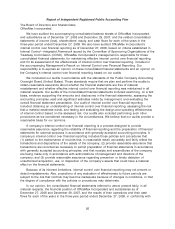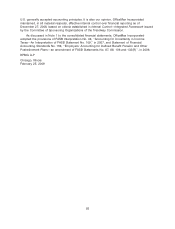OfficeMax 2008 Annual Report Download - page 87
Download and view the complete annual report
Please find page 87 of the 2008 OfficeMax annual report below. You can navigate through the pages in the report by either clicking on the pages listed below, or by using the keyword search tool below to find specific information within the annual report.In 2007, the Company granted to employees and nonemployee directors 786,282 RSUs. The
weighted-average grant-date fair value of the RSUs was $50.09. As of December 27, 2008, 552,350
of these RSUs were unvested, and vest after defined service periods as follows: 276,175 in both
2009 and 2010. Nearly all of the RSUs granted to employees in 2007 also require certain
performance criteria to be met. During 2008, management concluded that these performance
criteria would not be met for the 2007 plan.
In 2006, the Company granted to employees and non-employee directors 1,621,235 RSUs. The
weighted-average grant-date fair value of the RSUs was $27.36. As of December 27, 2008, 489,809
of these RSUs remained outstanding, all of which vest after defined service periods in 2009. All of
the RSUs granted to employees in 2006 also require achievement of certain performance criteria,
which have already been met.
In 2005, the Company granted to employees and nonemployee directors 728,123 RSUs. The
weighted-average grant-date fair value of the RSUs was $33.15. As of December 29, 2007, 6,000 of
these RSUs were unvested, and vest after defined service periods as follows: 3,000 units in both
2009 and 2010. All of the RSUs granted to employees in 2005 did not contain performance criteria.
In 2004, the Company granted 14,765 shares of restricted stock to non-employee directors.
The restricted stock granted to directors vests six months from their termination or retirement from
board service and 4,670 of these restricted stock shares remain outstanding at December 27, 2008.
These RSUs did not contain performance criteria.
Restricted stock are restricted until they vest and cannot be sold by the recipient until the
restriction has lapsed. RSUs are restricted until they vest and are convertible into one common
share after the restriction has lapsed. No entries are made in the financial statements on the grant
date of restricted stock and RSU awards. The Company recognizes compensation expense related
to these awards over the vesting periods based on the closing prices of the Company’s common
stock on the grant dates. If these awards contain performance criteria, management periodically
reviews actual performance against the criteria and adjusts compensation expense accordingly. In
2008, 2007 and 2006, the Company recognized $0.1 million, $26.4 million and $24.1 million,
respectively, of pre-tax compensation expense and additional paid-in capital related to restricted
stock and RSU awards.
Restricted stock and RSUs are not included as shares outstanding in the calculation of basic
earnings per share, but are included in the number of shares used to calculate diluted earnings per
share as long as all applicable performance criteria are met, and their effect is dilutive. When the
restriction lapses on restricted stock, the par value of the stock is reclassified from additional
paid-in-capital to common stock. When the restriction lapses on RSUs, the units are converted to
unrestricted common shares and the par value of the stock is reclassified from additional
paid-in-capital to common stock. Unrestricted shares are included in shares outstanding for
purposes of calculating both basic and diluted earnings per share. Depending on the terms of the
applicable grant agreement, restricted stock and RSUs may be eligible to receive all dividends
declared on the Company’s common shares during the vesting period; however, such dividends are
not paid until the restrictions lapse.
Stock Units
The Company has a shareholder approved deferred compensation program for certain of its
executive officers that allows them to defer a portion of their cash compensation. Previously, these
officers could allocate their deferrals to a stock unit account. Each stock unit is equal in value to
one share of the Company’s common stock. The Company matched deferrals used to purchase
stock units with a 25% Company allocation of stock units. The value of deferred stock unit accounts
is paid in shares of the Company’s common stock when an officer retires or terminates
83


